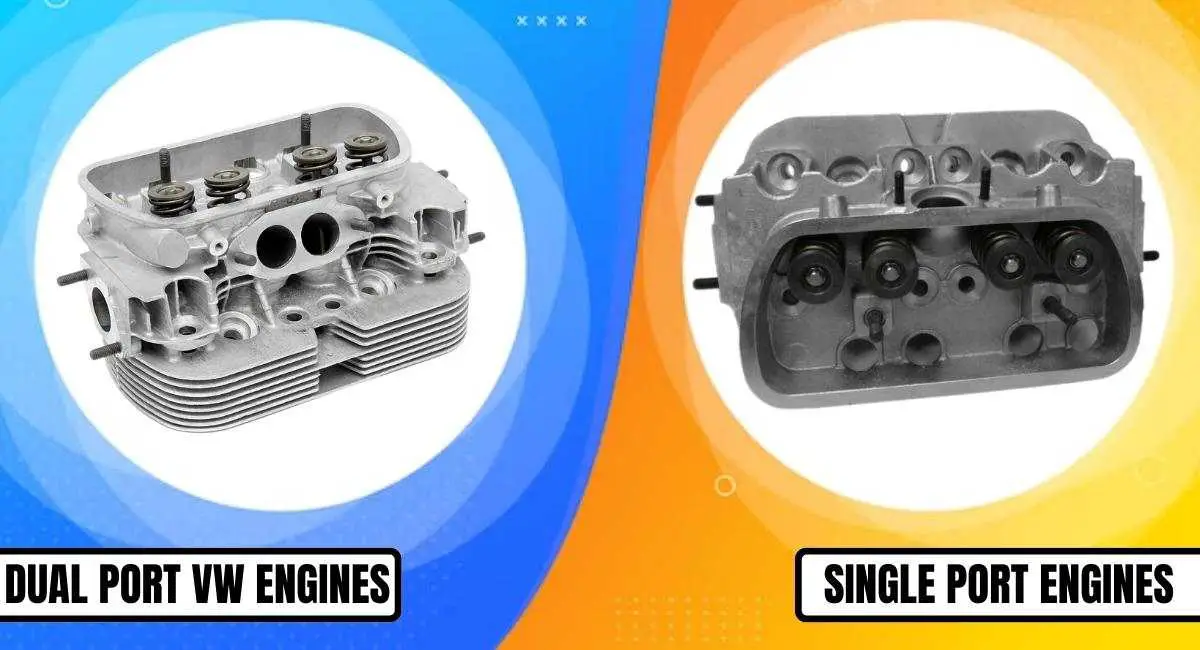The vibrant world of automotive engineering is a tapestry of innovation and evolution, weaving together centuries of technological advancements. Integral to this progression is the heart of the vehicle itself: the engine.
More specifically, the realm of Volkswagen (VW) engines presents a fascinating study of design subtleties and performance nuances. This German auto-giant, known for its distinguished engineering prowess and penchant for precision, provides enthusiasts and non-specialists alike with a captivating dichotomy – Single Port and Dual Port engines.
In this comprehensive analysis, we delve into the differences between Single-Port vs. Dual-Port engines, helping enthusiasts and curious readers alike to understand these design nuances.
A Detailed Overview of Single Port VW Engines
Single Port VW engines are a remarkable part of Volkswagen’s automotive history. These engines, standard in VW vehicles until the late 1960s, get their name from their distinct design feature – each cylinder has only one intake port for the air-fuel mixture. This design results in a single, centrally located intake manifold, setting the stage for the engine’s unique performance characteristics.
Performance Characteristics of Single Port VW Engines
By performance, Single Port engines are more reliable and fuel efficient. They provide steady, low-end torque, making them particularly adept at city driving and commuting. However, they usually offer less power at high RPMs due to the limited air-fuel intake caused by the single-port design.
Despite this, Single Port engines have earned a reputation for their sturdiness and longevity, standing the test of time with grace. Their dependable performance has made them a favorite among classic car enthusiasts and drivers who prioritize reliability and fuel economy over high-speed performance.
Applications and Usage of Single Port VW Engines
Due to their design and performance characteristics, single Port engines find their strengths in everyday driving scenarios. They are particularly suited to city driving or touring applications, where fuel economy and reliability take precedence over sheer power. Moreover, the less complex design of Single Port engines often translates to easier maintenance and repair, making them a practical choice for many drivers.
Advantages and Disadvantages of Single Port VW Engines
Like any mechanical design, Single Port engines have their advantages and disadvantages. On the positive side, they offer great fuel efficiency and are known for their robustness and reliability. They also have a simpler design, making servicing and repairs easier than Dual Port engines.
However, on the downside, Single Port engines are limited in terms of high-RPM power output due to their design. Where there is a desire for more power and speed, it makes them less suitable for high-performance applications or situations.
Single Port VW engines represent a blend of simplicity, reliability, and efficiency. They may lack the high-speed punch of Dual Port engines. Still, their dependability and fuel economy have secured them a solid spot in Volkswagen’s engine portfolio and the hearts of many drivers worldwide.
Insights into Dual Port VW Engines
Dual Port VW engines represent an exciting chapter in the evolution of Volkswagen’s engine designs. Introduced in the late 1960s as a successor to the Single Port engines, these powerhouses have a defining feature – each cylinder comes with two intake ports, which earns the engines their “Dual Port” moniker. This significant design change allows a larger air-fuel mixture to flow into the combustion chamber, ultimately boosting the engine’s power output.
Performance Characteristics of Dual Port VW Engines
Regarding performance, Dual Port engines offer several benefits over their Single Port counterparts. Thanks to the additional intake port, these engines can ingest more air and fuel per combustion cycle, translating into increased horsepower. It makes them noticeably peppier, especially at higher RPMs.
The performance edge that Dual Port engines offer is particularly noticeable during highway driving or when there is a need for more power for situations like overtaking. However, it’s worth noting that this performance boost generally comes at the expense of fuel efficiency. Dual Port engines consume more fuel than Single Port engines under similar driving conditions.
Applications and Usage of Dual Port VW Engines
Dual Port engines’ design and performance characteristics suit them for high-performance applications. They are popular among automotive enthusiasts who enjoy racing or simply desire more power from their vehicles. Moreover, Dual Port engines are best in scenarios where heavy-duty usage is anticipated, such as off-roading or towing.
Advantages and Disadvantages of Dual Port VW Engines
Dual Port engines come with their own set of pros and cons. On the upside, they offer more power and better high-RPM performance, which can be exhilarating for those who seek a performance-oriented drive. They also have larger intake and exhaust valves, which can increase engine efficiency and result in a cooler running engine.
However, on the flip side, Dual Port engines tend to be slightly less fuel-efficient than Single Port engines. They also require more maintenance due to their complex design.
Dual Port VW engines offer an exciting blend of power and performance, catering to those seeking a high-speed thrill. Despite their minor drawbacks, their popularity among performance enthusiasts remains unabated, a standing testament to VW’s prowess in crafting engines that excite and engage.

Comparing Single Port and Dual Port VW Engines
When comparing VW Single-Port vs. Dual-Port engine types, the most evident similarity lies in their fundamental operation principles. Both are air-cooled, horizontal four-cylinder engines following the classic VW boxer layout. However, the difference between single-port and dual-port VW engines is quite prominent.
Similarities in Design: The VW Blueprint
Despite their distinct characteristics, Single Port and Dual Port VW engines share fundamental design elements, affirming their shared lineage. Both engines are air-cooled, a trademark of classic VW engine designs.
They are also characterized by a horizontal four-cylinder arrangement in a boxer layout, ensuring a balanced distribution of forces and enhancing overall vehicle stability. The architecture of these engines is such that they provide a low center of gravity, further contributing to the trademark handling characteristics of VW vehicles.
Mechanical Variations: The Single and Dual Port Divergence
The principal mechanical distinction between Single Port and Dual Port VW engines is rooted in their respective intake manifold configurations. Single Port engines feature one port intake per cylinder, culminating in a central single intake manifold. Dual Port engines incorporate two inputs for each cylinder, giving rise to dual intake manifolds. This variation affects the air-fuel mixture distribution to cylinders.
Performance Contrasts: A Tale of Efficiency and Power
Regarding performance, the single port engines stand out for their fuel efficiency and reliable low-end torque, ideal for routine, everyday driving. This efficiency and smooth power delivery make Single Port engines a dependable choice for general-purpose driving.
On the contrary, Dual Port engines are more performance-oriented with their increased horsepower and superior performance at higher RPMs. The dual port design enables a larger air-fuel mixture to enter the combustion chamber, increasing power output. However, this comes with a trade-off: Dual Port engines tend to be slightly less fuel-efficient than their Single Port counterparts.
Practical Implications: The Influence on Driving Experiences
The mechanical and performance differences between Single Port and Dual Port VW engines inevitably translate into unique driving experiences. With their efficiency and reliability, Single Port engines offer a calm, untroubled drive, particularly suited to everyday commuting and city driving.
In contrast, with their power boost and high-RPM performance, the Dual Port engines are for those seeking more thrill and engagement from their vehicle. These engines are particularly favored by racing enthusiasts and those desiring a more performance-tuned driving experience.
The choice between Single Port and Dual Port VW engines often concerns individual needs, preferences, and driving styles. Both designs, rooted in VW’s tradition of engineering excellence, offer unique benefits and experiences, catering to a wide spectrum of drivers.
Case Studies: Single Port vs. Dual Port VW Engine
For a more practical perspective, let’s consider two case studies. A 1967 VW Beetle with a single port engine offers a smooth, reliable driving experience with adequate power for city driving and fuel economy. On the flip side, a 1971 VW Super Beetle with a dual port engine exhibits enhanced power, accelerates quickly, and is more engaging to drive at high speeds, albeit at the cost of slightly lower fuel economy.
Personal Preferences: VW Single Port vs. Dual Port
Preference between the two engine types often concerns the individual’s driving style and requirements. A single-port engine is an excellent choice for a driver seeking a reliable, fuel-efficient car for daily commuting. However, for the automotive enthusiast who enjoys high-speed thrills, a dual port engine would provide the performance edge they crave.
Conclusion
The discussion on Single Port vs. Dual Port VW engines is a tale of evolutionary engineering brilliance. While both designs offer unique benefits, the choice often concerns individual preferences and needs. As VW continues to innovate and design, the landscape of engine configurations will undoubtedly continue to evolve, offering many options for drivers worldwide.
Important Read: An Analysis of Pilot Bearing vs Throwout Bearing Noise
In the end, whether you are an everyday commuter or a racing enthusiast, understanding these engine designs’ intricacies can help you make an informed choice and get the most out of your VW experience.
